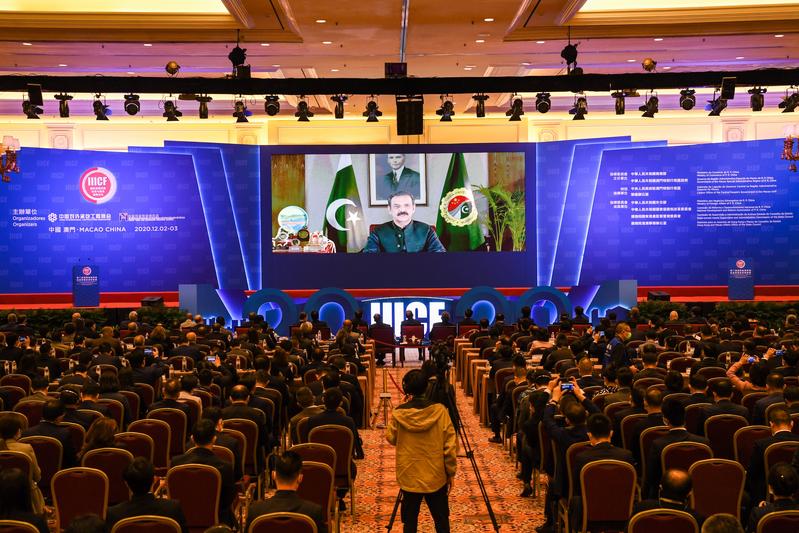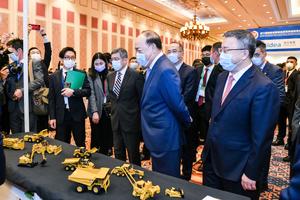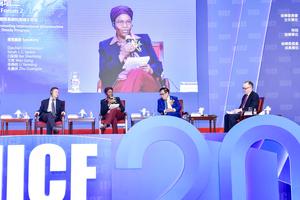 The opening ceremony of the 11th IIICF draws hundreds of onsite participants as well as thousands of online audience with speakers from a number of countries on Dec 2, 2020. (PHOTO / CHINA DAILY)
The opening ceremony of the 11th IIICF draws hundreds of onsite participants as well as thousands of online audience with speakers from a number of countries on Dec 2, 2020. (PHOTO / CHINA DAILY)
Broader cooperation on green and inclusive capacity building in infrastructure along countries engaged in the Belt and Road Initiative will not only help the nations overcome key economic challenges, it will also allow them to boost people’s livelihoods, according to the 11th International Infrastructure Investment and Construction Forum on Dec 2.
Whatever may change, "the overall trend of accelerating the transformation and upgrading of basic infrastructure construction through international collaboration will not change,” Vice Minister of Commerce Wang Bingnan said in a keynote speech. “And the prospects for broader cooperation in the area of infrastructure between China and other countries in the world will remain unchanged.”
Vice Minister of Commerce Wang Bingnan proposed four points in response to pandemic and other challenges in a keynote speech
He proposed four points in response to pandemic and other challenges: First, to open up more proactively and strengthen collaboration, particularly in the public health infrastructure area; second, to deepen interconnections to serve regional economic integration and development; third, to optimize the modes of investment and financing to fill the funding gap; and fourth, pushing innovation in informatization and digitization, and promoting integrated growth of new and traditional infrastructure.
READ MORE: Macao shows signs of recovery as drop in gaming revenue narrows
The11th IIICF brings together 32 ambassadors, senior executives from over 20 financial institutions, and representatives of top contractors and engineering equipment companies, international consulting firms, and engineering and construction services, with more than 1,000 guests present at the largest public event in Macao so far this year.
Macao will be one of the key link points for global connectivity as it taps its potential in bridging Chinese and international markets in new era’s dual circulation, said Ho Iat-seng, Chief Executive of the Macao Special Administrative Region.
Macao will be one of the key link points for global connectivity as it taps its potential in bridging Chinese and international markets in new era’s dual circulation, said Ho Iat-seng, Chief Executive of the Macao Special Administrative Region
Themed “Responding to Challenges and Promoting Global Infrastructure Development” this year, the two-day event is organized by the China International Contractors Association (CHINCA) and Macao Trade and Investment Promotion Institute (MTIPI). Apart from opening ceremony addresses, varied panels are held on a range of topics, including current opportunities and challenges that face international infrastructure cooperation.
Ho said: “The happening of the event will inject new energy into its economic recovery of the city.”
He went on to say the forum “serves as an important platform for the city to take part in the Belt and Road Initiative and engage in the Bay Area collaboration activities.”
The IIIC, which was established in 2010, has matured into a leading international infrastructure event over a decade.
Fang Qiuchen, chairman of CHINCA and host of the morning opening ceremony, pointed out that there still were opportunities for international infrastructure collaboration despite the pandemic’s impact.
In a previous conference about the forum, Fang noted that from a domestic perspective, the country continues to open up to the outside world, while sticking to its "dual circulation" approach, and increased policy support for enterprises "going global".
From an international perspective, increasing infrastructure investment has always been seen as an important means for stimulating a country’s economic development. When the economic conditions are not so positive, infrastructure can also serve as a way for the country to promote economic development.
“Infrastructure investment and construction will be key” to reviving the jobs market and national economies, said Asim Saleem Bajwa, chairman of the China-Pakistan Economic Corridor (CPEC) Authority.
Despite the pandemic, about a dozen major projects in Pakistan were proceeding as per schedule, according to Bajwa.
ALSO READ: Macao seizes opportunities in reviving pandemic-hit economy
“Under CPEC, no project has been suspended for construction, and no worker has been laid off,” he said. Citing an example, he said China’s Gezhouba hydropower group had chartered seven passenger planes to transport staff to Pakistani sites.
Pakistan will enhance its infrastructure building and welcome investors from all over the world, Bajwa told the Macao forum, which included a large on-site audience, via video link from Islamabad.
Later at the forum Moin ul Haque, Ambassador of Embassy of Pakistan in China, invites the audiences to applaud Chinese staff who made it possible for the projects such as Lahore’s Orange Metro Line complete.
Cambodia’s Minister of Public Works and Transport Sun Chanthol said his country is going ahead with about a dozen highway and airport projects.
Cambodia’s Minister of Public Works and Transport Sun Chanthol said his country is going ahead with about a dozen highway and airport projects
Infrastructure investment and construction are crucial for every country’s social and economic development as they create opportunities for growth, generate jobs, and facilitate trade and investment, he said.
Such activity will also enhance a nation’s competitiveness by improving connectivity across countries and regions, Chanthol said.
“Cambodia believes the Belt and Road Initiative is a positive and new path for country-to-country relations,” said the minister, adding that he looks forward to a more open, transparent, non-discriminatory, and inclusive and balanced economic globalization.
The Macao forum brought together more than 30 ambassadors to China, among various government officials, and representatives from leading infrastructure construction companies.
Baba Ahmad Jidda, Ambassador of Embassy of Nigeria in China, noted in his address that the largest African economy is prioritizing 10 large-scale infrastructure projects and appreciates China’s help to Africa during the pandemic.
 Ho Iat-seng (center), Chief Executive of the Macao Special Administrative Region, and Fang Qiuchen (right), chairman of CHINCA, exchange views on exhibits with other guests at the 11th International Infrastructure Investment and Construction Forum (IIICF) in Macao on Dec 2, 2020. (PHOTO / CHINA DAILY)
Ho Iat-seng (center), Chief Executive of the Macao Special Administrative Region, and Fang Qiuchen (right), chairman of CHINCA, exchange views on exhibits with other guests at the 11th International Infrastructure Investment and Construction Forum (IIICF) in Macao on Dec 2, 2020. (PHOTO / CHINA DAILY)
Sarah J.C. Serem, Kenyan ambassador to China, stressed that cooperation is important in our new era. Kenya will build strong partnerships and take overall approach in information sharing, capacity building, financing and environment. His points are echoed among other panel speakers.
Indonesia Ambassador to China Djauhari Oratmangun said Indonesia has a synergic initiative in releasing about 200 projects and the number will grow in the following years to echo its emphasis on infrastructure.
Tomas Kuta, senior vice-president of sales at Volvo Construction Equipment (Volvo CE), noted that “in this difficult time construction and infrastructure matters more than ever.”
From building hospitals in days to donating lifesaving equipment, the industry has played a critical role in responding to the crisis and in the recovery, he said.
Sustainability, automation and connectivity are critical to the world’s future, said Kuta.
Vice Minister Wang said because of the pandemic impact, signs of trade protectionism, anti-globalization and unilateralism continue to grow, with a further influence on international infrastructure cooperation and its sustainable development, as well as an increase in business operation risks, he added.
“We can only overcome the difficulties by dealing with them in a joint effort, and make continuous progress though continuing to apply new technologies, new products, new processes, and new equipment in the industry,” Wang said.
As challenges become more complex for a single enterprise or country to handle, “it becomes more important for us to collaborate,” Kuta said, adding that he hopes to partner with customers, suppliers and almost everyone at the forum “to shape the future together”.
Asia is taking a growing role in overall global infrastructure investments, with key drivers being Indonesia, India, Japan and China, he said.
Joachim von Amsberg, vice president of policy and strategy at Asian Infrastructure Investment Bank (AIIB), noted that BRI has consolidated global partnerships at a panel discussion on the “outlook on International Infrastructure Development in post COVID-19 Era”
He noted that BRI has consolidated global partnership. And above the challenges, opportunities abound for future vitality as infrastructure sector is the foundation for social, economic growth.
While there are challenges, opportunities abound for future vitality as the infrastructure sector is the foundation for social, economic growth, he said.
Zhu Xian, senior vice president of New Development Bank, a multilateral; institution established by the BRICS bloc, said people should look beyond the pandemic with hope.
Emerging market economies will be transformed for smarter, greener, and more sustainable development, Zhu said.
He emphasized digital infrastructure, green financing, and post-COVID health systems as having vast potential in terms of future opportunities.
Vice President of CSCEC Zhou Yong hoped that host countries of BRI will focus on livelihood-related projects so that locals will enjoy the benefits. And it’s better for Chinese and investors from other countries to work with locals and create local jobs.
A keynote discussion bearing the theme “Solidarity and Cooperation: Jointly Promoting International Infrastructure Development in a Steady Progress” took place on the first day of the forum.
Speakers noted that further cooperation in infrastructure will be important to meet the global needs of economic recovery in the post-pandemic era.
 Panelists discuss challenges and opportunities of infrastructure building in the post-COVID era at the 11th IIICF Dec 2, 2020 in Macao. (PHOTO / CHINA DAILY)
Panelists discuss challenges and opportunities of infrastructure building in the post-COVID era at the 11th IIICF Dec 2, 2020 in Macao. (PHOTO / CHINA DAILY)
Given the diminishing capacity of governments to take on additional public debt, participants said they expect to see the further adoption of innovative financing infrastructures to mobilize private capital.
They also emphasized the priority for health and digital infrastructure in the wake of the pandemic, in addition to continued investment in economic infrastructure such as transportation and energy.
Noting the importance of technology in developing “new infrastructure”, speakers said the integration of technology and infrastructure will help stimulate digitalization and promote sustainable development.


